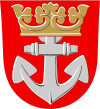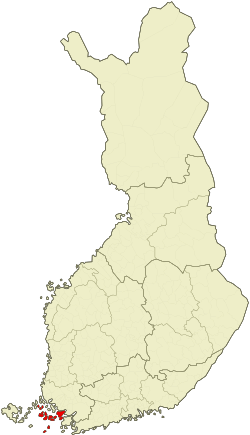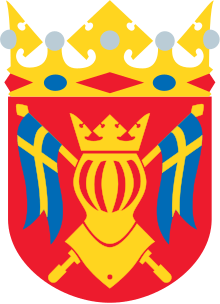Pargas
Pargas (Finnish: Parainen) is a town and municipality of Finland, in the Archipelago Sea. The big limestone mine in Pargas is the base of the main industry and except for the central parts, the municipality is still mostly rural.
Pargas Pargas – Parainen | |
|---|---|
Town | |
| Pargas stad Paraisten kaupunki | |
The city centre of Pargas | |
 Coat of arms | |
 Location of Pargas in Finland | |
| Coordinates: 60°18′N 022°18′E | |
| Country | |
| Region | Southwest Finland |
| Sub-region | Åboland–Turunmaa sub-region |
| Charter | 2009 |
| Seat | Pargas |
| Government | |
| • Town manager | Patrik Nygrén |
| Area (2018-01-01)[1] | |
| • Total | 5,548.17 km2 (2,142.16 sq mi) |
| • Land | 881.79 km2 (340.46 sq mi) |
| • Water | 4,666.46 km2 (1,801.73 sq mi) |
| Area rank | 88th largest in Finland |
| Population (2019-01-31)[2] | |
| • Total | 15,225 |
| • Rank | 75th largest in Finland |
| • Density | 17.27/km2 (44.7/sq mi) |
| Population by native language | |
| • Swedish | 57.6% (official) |
| • Finnish | 41.2% |
| • Others | 1.2% |
| Population by age | |
| • 0 to 14 | 17.2% |
| • 15 to 64 | 63.3% |
| • 65 or older | 19.5% |
| Time zone | UTC+02:00 (EET) |
| • Summer (DST) | UTC+03:00 (EEST) |
| Municipal tax rate[5] | 19.25% |
| Website | www.pargas.fi |
Pargas is located in Åboland in the province of Western Finland and is part of the Southwest Finland region. It was created as Väståboland on January 1, 2009 in Southwest Finland, when the municipalities of Pargas, Nagu, Korpo, Houtskär and Iniö were merged into a single municipality.
The municipality has a population of 15,225 (31 January 2019)[2] and covers an area of 5,548.17 square kilometres (2,142.16 sq mi) of which 4,666.46 km2 (1,801.73 sq mi) is water.[1] The population density is 17.27 inhabitants per square kilometre (44.7/sq mi).
The town is bilingual with a majority (57.6%) speaking Swedish as their native language.[3]
Economy
Pargas has a large limestone industry, with the industry and Nordkalk as an important local employer, agriculture employs many in the rural regions of the municipality. Furthermore, the shipping industry is a relevant industry in the region.[6] The municipality is suffering from high debt.[7]
History
Archaeological excavations revealed that the vikings used to travel to the archipelago in the 9th century.[6]
Karin Thomasdotter (1610–1697), who served as vogt in Pargas for over forty years, was one of the longest serving vogts, and also one of only two females to have the position in contemporary Finland.[8][9]
Recent history
On 1 January 2009, Pargas, Nagu, Korpo, Houtskär and Iniö merged to form the new municipality of Väståboland (Finnish: Länsi-Turunmaa).[6]
Name dispute
Shortly after the merge people started debating if the Väståboland name was the right name for the merged municipality, those arguing against the Väståboland name, proposed Pargas as a 'new' name. The former municipalities could not agree on a new name and Pargas insisted on a change, so the state had to step in and decided the name to be Väståboland.[10] The debates became heated and a referendum was arranged to decide what name the municipality should have in May 2011.[11] The result of the referendum showed that 57,7% of the voters supported Pargas and 40.1% of voters supported Väståboland. Though the overall majority supported changing the name, there was an overwhelming support for the name Väståboland in 4 out of 5 of the former municipalities. In Iniö only 1 voter out of 173 total voted for Pargas, in all the four 62 out of 2060, while in Pargas 74,5% voted for Pargas.[12]
The municipality council (Swedish: "Fullmäktige") decided on 14 June 2011 in favour of the majority population and decided to rename the municipality Pargas on 1 January 2012.[13] The Council considered to take this issue up again for debate and vote.[14] The council made a re-vote on 6 September 2011 with 25 votes for Pargas, 17 for Väståboland and 1 blank vote.[15]
Merge with Kimitoön
The possibility of merging with Kimitoön to form a single municipality that would include the entire Åboland archipelago has been discussed since 2007, with interest being reignited by the healthcare reforms during the Sipilä Cabinet.[16]
International relations
References
- "Area of Finnish Municipalities 1.1.2018" (PDF). National Land Survey of Finland. Retrieved 30 January 2018.
- "Suomen virallinen tilasto (SVT): Väestön ennakkotilasto [verkkojulkaisu]. Tammikuu 2019" (in Finnish). Statistics Finland. Retrieved 15 March 2019.
- "Population according to language and the number of foreigners and land area km2 by area as of 31 December 2008". Statistics Finland's PX-Web databases. Statistics Finland. Retrieved 29 March 2009.
- "Population according to age and gender by area as of 31 December 2008". Statistics Finland's PX-Web databases. Statistics Finland. Retrieved 28 April 2009.
- "List of municipal and parish tax rates in 2011". Tax Administration of Finland. 29 November 2010. Retrieved 13 March 2011.
- "Discovering Swedish-speaking municipalities: Pargas". Helsinkitimes.fi. Retrieved 28 December 2017.
- "Ekonomin högst upp på den väståboländska agendan". Svenska.yle.fi. Retrieved 28 December 2017.
- Suomen kansallisbiografia (National Biography of Finland)
- Ohlander, Ann-Sofie. Tusen svenska kvinnoår, 2008. Upplaga 3. uppl.
- "Det blev Väståboland stad". Hbl.fi. Retrieved 28 December 2017.
- Oy, Ch5 Finland. "Folkomröstning angående stadens namn". Vastaboland.fi. Retrieved 28 December 2017.
- Oy, Ch5 Finland. "Rådgivande kommunal folkomröstning 22.5 - resultat". Vastaboland.fi. Retrieved 28 December 2017.
- "Väståboland blir Pargas". Hbl.fi. Retrieved 28 December 2017.
- "Regeringen ändrar på förutsättningen för namnfrågan". Svenska.yle.fi. Retrieved 28 December 2017.
- Oy, Ch5 Finland. "Fullmäktige beslöt om stadens namn". Vastaboland.fi. Archived from the original on 17 September 2012. Retrieved 28 December 2017.
- ""Åboländsk storkommun måste diskuteras"". Svenska.yle.fi. Retrieved 28 December 2017.
